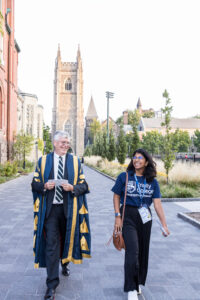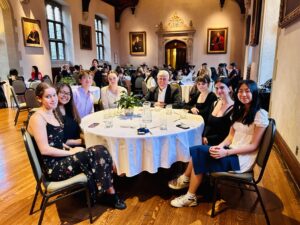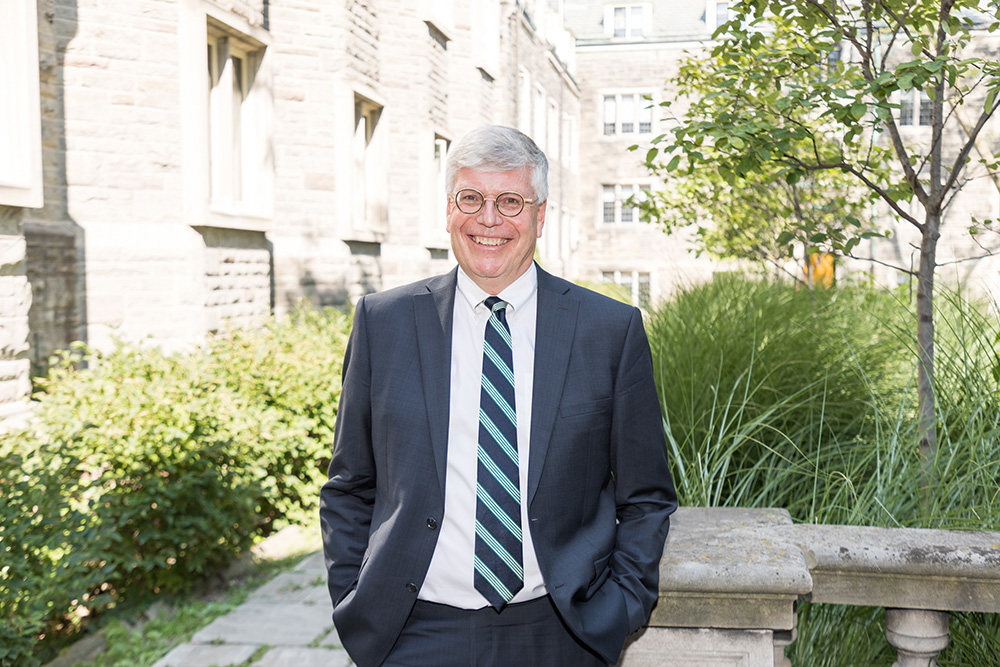On July 1, 2024, Nicholas Terpstra became the 16th Provost and Vice-Chancellor of Trinity College. As Professor of History at U of T, he holds cross-appointments with the Centre for Medieval Studies, Department of Italian Studies and Department for the Study of Religion. Welcome to Trinity!
Nicholas Terpstra and incoming Trinity students are simpatico on a number of levels. At this year’s Matriculation, as new students signed the College Register and he was officially installed as Trinity’s 16th provost, Terpstra admitted to having his own first-year butterflies about beginning this new chapter.
“These are the years, and this is the place where you create and recreate yourself. And this is the community that will get it,” he reassured students.
“And what about Trinity? We’re also at a point of change, of testing and recreating ourselves … We talk, we test, we experiment, we evaluate. Our common challenge this year is to open the conversation. To position ourselves between a past that shaped us and a future we can’t yet fully see.
“That’s the challenge of a community that respects, listens, and learns from its past and present. A community made up of people who respect, celebrate, and promote each other. We’re in this together, and it’s going to be an exciting ride. Welcome to Trinity.”
It was a fitting beginning for Trinity’s students — and for its new Provost.

Why Trinity?
Terpstra’s experience teaching and leading within other federated colleges, elsewhere in Canada and then at Victoria College and St. Michael’s College at U of T, convinced him of the value of the model. “I like the idea of a smaller community within the broader university,” he says. “It seems to me to be the best way of combining something that’s powerful and research-oriented with something that’s more intimate and communal.”
Still, Trinity College remained something of a mystery until then-Provost Mayo Moran asked Terpstra to lead a review of the Dean of Arts role in 2023 with then-Dean Michael Ratcliffe approaching retirement.
“In the process of that work I began to gain a better understanding of Trinity from the inside. I’d always been impressed by Trinity students in my classes, and having a window into the College’s inner workings was inspiring,” Terpstra says. So when he was nominated to be considered for the role of provost in 2024, he agreed to throw his hat in the ring.
Renaissance man
Terpstra is the first to admit he didn’t think he would end up here. A distinguished scholar of the Renaissance period, he has taught in and led academic departments of History and Italian Studies, and has been active in international academic societies, like the Renaissance Society of America, throughout his career .
He created the DECIMA (Digitally Encoded Census Information & Mapping Archive) project, an online digital map of Renaissance Florence together with Trinity alum Colin Rose ’08, and has published extensively on the intersection of politics, religion, gender, and charity in Renaissance Italy. Recent works include Senses of Space in the Early Modern World (Cambridge: 2023) and Religious Refugees in the Early Modern World: An Alternative History of the Reformation (Cambridge: 2015). Earlier works include the award-winning Cultures of Charity: Women and the Reform of Poor Relief in Renaissance Italy (Harvard: 2013) and the microhistory Lost Girls: Sex and Death in Renaissance Florence (Johns Hopkins: 2010).
In Lost Girls, Terpstra’s focus was on an unusual, somewhat radical 16th century home for abandoned girls in Florence that was run entirely by women. But somewhere along the way men took over the home’s management, and the women disappeared from its history.
“Part of what I try to challenge is self-congratulatory narratives that cover over or eliminate examples of oppression and suppression,” Terpstra explains. “I was trying to recover both the voices and the history of these women and of the girls they looked after. And it was challenging because in many cases, the documents have been obscured and even destroyed … The only way to learn the truth is to dig through the physical archives, unearth the original historical records and puzzle through the silences.”
Collaborative approach
Terpstra’s approach to understanding history is mirrored in his approach to understanding Trinity — engaging directly with community members, questioning, gathering information and interpreting the new details that emerge.
“For me, leadership is about stewardship. The Trinity community has a strong sense of itself, and a lot of shared values and priorities. My role is to ensure that all voices are heard.”
He favours in-person conversations to Zoom meetings whenever possible, and views his schooling in “Trinity 101” as an iterative process. “It’s a constant revolution,” he says. “As I meet with people I’m gradually learning more and more about Trinity, understanding where people are today, and where our community wants to go.”
Setting priorities
As the chief executive officer of Trinity College, the provost has a broad mandate with overall responsibility for academic and administrative leadership. Furthering the College’s vision and priorities to enhance programs and opportunities for students, the provost leads strategic planning and fundraising, builds relationships with the community, and works in partnership with the University of Toronto and the Toronto School of Theology.
Terpstra is taking things one step — one conversation — at a time.
“Priority number one is completing the building of the beautiful new Lawson Centre for Sustainability. Spearheaded by my predecessor, Mayo Moran, the construction of the new building is well underway, and will add so much to our campus and our community,” Terpstra says. “We’ll also be expanding the sustainability-focused academic programs that are a key priority of the Living Trinity Campaign, and starting to shape the next steps on a strategic pathway toward the future. I’m tremendously excited about what’s ahead for the College.”

Student favourite
Pausing his teaching for the coming year as he focuses on his new role has been difficult for Terpstra. “It’s such a privilege to be able to teach the kinds of students we have here,” he says. “When students are really interested in what they’re learning, there’s an energy that comes from them — I can’t imagine doing anything else.”
Terpstra is a favourite of students, who describe him as “engaging,” “passionate,” “easily the best professor I’ve ever had” — “someone who “made history come alive” and who “truly cares about his students.” In 2010, he received an Outstanding Teaching Award from the Faculty of Arts & Science at U of T. He received an Inspiring Teaching Award from the University of Regina in 1996.
Although he won’t be in the classroom this year, there will still be plenty of opportunities for Terpstra to connect with Trinity students. Case in point: He recently attended the first of several residence house dinners, where “I met young people who have come from all over the world to attend Trinity. It was gratifying and fascinating to learn more about them and to see that they’re already starting to feel connected to the Trinity community.”
Making a home at Trinity
After some painting and the installation of new art from Trinity’s collection, Terpstra has now moved into the Provost’s Lodge, his new home. He’s very much enjoying being immersed in the community, even though an interesting twist of fate makes living where he works is not quite as straightforward as it could be. His wife, Angela Terpstra, lives on-site as part of her role as Head of School at the Bishop Strachan School, an independent, all-girls school in Toronto .

Luckily, the pair are not far apart. “We’ve actually measured it — it’s two and a half kilometres; about 15 minutes on the number 13 bus,” Terpstra smiles. Besides, the couple has navigated larger distances over their 42-year marriage as Terpstra’s research and fellowships at universities in the U.K., U.S., Italy, Australia and Israel have often taken him abroad.
As he settles into his new home and his new role, one thing is clear from watching him greet students, chat with staff, or meet alumni — Nicholas Terpstra already fits right in at Trinity, and we are all looking forward to the conversations to come.
By Jennifer Matthews
Nick: Up close and personal
Pasta or potatoes? “Angela and I both grew up in potato households, but after living in Italy it’s almost always pasta now.”
Monthly dinners: “Once a month I host my doctoral students in my home. I cook something simple — maybe a pasta, or a chicken and leek dish — we eat, discuss their research and writing, and exchange ideas.”
Alternate life: “As a teenager I thought I would become an architect. Unfortunately, I really can’t draw.”
Current reads: “The New Yorker is always on my bedside table. I’m also currently reading The Real Work by Adam Gopnik, and The Essence of Invention: Medicine and the Joy of Creativity by Dr. Kieran Murphy.”
Nature lover: “Walking the Bruce Trail is a favourite pastime.”
Media moment: “I was interviewed for an episode of the upcoming docuseries No Taste Like Home with Antoni Porowski.”

